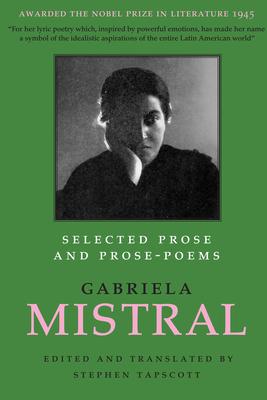The first Latin American to receive a Nobel Prize for Literature, the Chilean writer Gabriela Mistral (1889-1957) is often characterized as a healing, maternal voice who spoke on behalf of women, indigenous peoples, the disenfranchised, children, and the rural poor. She is that political poet and more: a poet of philosophical meditation, self-consciousness, and daring. This is a book full of surprises and paradoxes. The complexity and structural boldness of these prose-poems, especially the female-erotic prose pieces of her first book, make them an important moment in the history of literary modernism in a tradition that runs from Baudelaire, the North American moderns, and the South American postmodernistas. It's a book that will be eye-opening and informative to the general reader as well as to students of gender studies, cultural studies, literary history, and poetry.
This Spanish-English bilingual volume gathers the most famous and representative prose writings of Gabriela Mistral, which have not been as readily available to English-only readers as her poetry. The pieces are grouped into four sections. "Fables, Elegies, and Things of the Earth" includes fifteen of Mistral's most accessible prose-poems. "Prose and Prose-Poems from Desolacin / Desolation [1922]" presents all the prose from Mistral's first important book. "Lyrical Biographies" are Mistral's poetic meditations on Saint Francis and Sor Juana de la Cruz. "Literary Essays, Journalism, 'Messages'" collects pieces that reveal Mistral's opinions on a wide range of subjects, including the practice of teaching; the writers Alfonso Reyes, Alfonsina Storni, Rainer Maria Rilke, and Pablo Neruda; Mistral's own writing practices; and her social beliefs. Editor/translator Stephen Tapscott rounds out the volume with a chronology of Mistral's life and a brief introduction to her career and prose.
